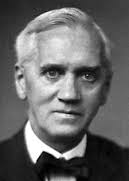Get Today in Masonic History into your Inbox. Sign up today for one of our email lists!
Need an article for your Trestleboard/Newsletter see our Use Policy
Alexander Fleming is Born

Today in Masonic History Alexander Fleming is born in 1881.
Alexander Fleming was a Scottish pharmacologist, botanist and biologist.
Fleming was born at Lochfield Farm near Darvel, Scotland on August 6, 1881. Fleming's one of four children from his fathers second marriage. Fleming's father was 59 when he married the second time and by the time Fleming turned 7 his father passed away.
After attending local schools and receiving a scholarship to Kilmamock Academy, Fleming attended the Royal Polytechnic Institution in London. On the advice of his older brother, who had already become a doctor, Fleming began pursuing a medical degree. In 1903 he enrolled in St. Mary's Hospital Medical School where he received a Bachelor of Medicine, Bachelor of Surgery degree in 1906.
While at the St. Mary's, Fleming was a private in the London Scottish Regiment, Volunteer Force. He was also a member of St. Mary's rifle club. The captain of the club eager to keep Fleming around, encouraged Fleming to join the research department of St. Mary's. There Fleming worked for Almroth Wright a pioneer in immunology and vaccine therapy.
Fleming served throughout World War I as an Army Doctor. During his time in the war he observed the antiseptics commonly used at the time were causing more harm then good with many patients. He published a paper during the war on the subject. Unfortunately many Army surgeons took little notice of Fleming's findings.
In 1921, Fleming discovered "Lysozyme" an enzyme which attacks the cell walls of bacteria.
In 1927, Fleming had begun research into Staphylococci. Although he had gained quite a reputation in the medical community, he also was notorious for keeping a messy lab. In 1928, he had gone on vacation through August with his family returning in early September. When he returned he discovered one of his Staphylococci had been contaminated. He discovered the fungus, a member of the Penicillium genus, had a destructive effect on the Staphylococci. For months after the initial discovery, Fleming referred to the substance killing the Staphylococci as "Mold Juice". He eventually called it the more familiar name penicillin.
It took until the early 1940's before Penicillin was massed produced in enough quantity to have an effect on human health. Fleming shared the Nobel Prize with the two men who developed the techniques to mass produce it.
Fleming passed away on March 11th, 1955.
Fleming was a member of London Scottish Rifles Lodge No. 2310.
This article provided by Brother Eric C. Steele.

